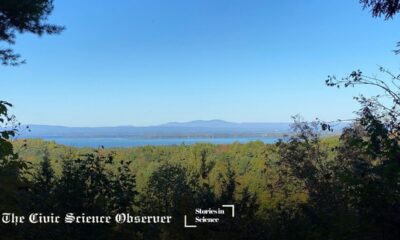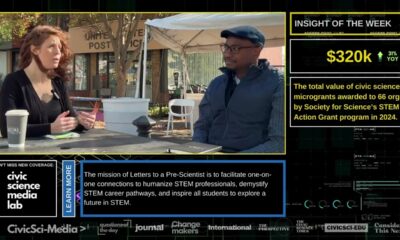Stories in Science Special Series
From Bug Barns to Morse Code
When I was seven or eight years old, my parents asked me what I wanted for my birthday. I thought real hard and then confidently stated, “I want either a diamond or a bug barn.” I collected bugs in that wire insect prison all summer long. My parents made the right choice. In retrospect, I’m sure it wasn’t a tough one, but it fit right in among my chemistry set, the crystals growing in my bedroom, and the numerous generations of sea monkeys I was raising.

– Jessica Parks, Ph.D. –
[su_boxbox title=”About Jessica Parks” box_color=”#262733″]About Jessica Parks: Jessica Parks is an eyewitness memory expert, working in the court system by day, and indulging her alter ego as an educational course entrepreneur by night. Follow her @SkilmanOnTheQT. [/su_boxbox]
[su_boxnote note_color=”#DAF7A9″]Take away points
- Life can take you in many different directions and they are all good.
- Never give up on your passion. Find a way to use it.
- Sometimes, new life directions can come out of something as simple as a conversation.[/su_boxnote]
[dropcap]W[/dropcap]hen I was seven or eight years old, my parents asked me what I wanted for my birthday. I thought real hard and then confidently stated, “I want either a diamond or a bug barn.” I collected bugs in that wire insect prison all summer long. My parents made the right choice. In retrospect, I’m sure it wasn’t a tough one, but it fit right in among my chemistry set, the crystals growing in my bedroom, and the numerous generations of sea monkeys I was raising.

Jessica Parks, Ph.D.
Flash forward to college and my love for science followed me. I majored in biology and psychology and I was tickled pink to be able to do both because, of course, I couldn’t pick just one science. It wasn’t until I was in Dr. Jarvis’s cognitive psychology class that it happened, though. I believe professors call it the “ah-ha moment.” The day wasn’t any different than any other day, her lecture no more gripping than previous classes, but it was that day that she made an offhand comment. She asked, “How do you know that time didn’t start this very second?” It was simply a question I had never thought about before. I had never really thought about the fact that I was relying on my memory to believe that something, anything, had happened before that very second. And, the professor continued… “we know that memory isn’t perfect. That we sometimes forget things, remember them differently than they really were, remember them differently than others who were there at the same time and saw the same thing.” So, not only was I not certain that anything existed prior to that second, I couldn’t even count on my memory to tell me the true story if I believed I had a history. This started me down a road to learning more about memory. I didn’t know what I wanted to do with that information. I just knew I needed to know everything there was to know about memory.
So, I never really put the proper thought into whether or not I would actually like working in academia. Instead, I just assumed that I was on a trajectory to teach and do research just like all of the professors I’d surrounded myself with for the better part of a decade.
Two years later, I was in graduate school studying eyewitness memory. Four years later, I walked out of that ivory tower with a Ph.D. in hand. But, what I didn’t do all that time – when I was so carefully studying people’s memories of the past – was to plan for my future. You see, I assumed that I would go out into the world, find a job teaching, and repeat the cycle. I would inspire some other student just like Dr. Jarvis inspired me, and that’s how happily ever after would happen. So, I never really put the proper thought into whether or not I would actually like working in academia. Instead, I just assumed that I was on a trajectory to teach and do research just like all of the professors I’d surrounded myself with for the better part of a decade. It was a foregone conclusion and it was bolstered by the fact that I got a job at a small private college after my first interview.
Quickly, it was clear to me that I had made a mistake. Teaching was okay the first couple of times I taught a class, but then it became boring and repetitious. And, it slowly dawned on me that all of the research I was doing was going to sit on a library shelf along with the research of others like me and never get used in real life by real people who really needed the information. What police officer or juror ever goes to the library and pulls peer-reviewed journal articles to figure out if the story they are hearing is true?
But, I had been fortunate enough to have the opportunity to teach a class on Psychology and Law a few times and I had been infinitely more interested in the subject than the students. While I knew eyewitness memory like the back of my hand, teaching the class exposed me to other areas of the field that weren’t as familiar. And so, as it turned out, a few years out of grad school I was hitting the pavement looking for a new career in psychology and law. And, as luck would have it, I found one. I began a position doing evaluations and technical assistance for a court program that diverted mentally ill and addicted individuals from jail or prison and into treatment.
As much as I loved the job, something was missing. I was born to do memory. It was the only thing in my life that had ever grabbed me by the shoulders and shook me, and after a decade waltzing with it, I’d cut it out of my life. So, imagine my joy when one day my husband, an avid ham radio aficionado, told me of his trials and tribulations trying to learn Morse code. As I listened to how he had gone about it (essentially rote memorization), I couldn’t help but think it was an extraordinary difficult way to commit something so complex to memory. As our conversation unfolded, I came to understand that there really weren’t any good materials on the market for people who wanted to learn the code. Challenge accepted.
I got to work collecting relevant research and designing a Morse code learning course using the memory principles I’d studied for so long. 1500 audio files and six CDs later, skilman.com was born. I had poured my heart and soul into those CDs and produced a product that I was proud of, not just because of its sound underpinnings but because all those years of gathering knowledge about memory was finally going to be used by real people.
Now, three years later, we are gearing up to create On the QT, an online educational game that teaches kids Morse code through a mystery. The thought of kids using the code that I taught them to hold secret conversations with their friends, do magic tricks, and cheat at cards all while being more prepared for a real-life emergency than most adults truly inspires me. I never could have imagined that my life would take this turn. Yet, that little girl who wanted a bug barn is smiling at me and thinks it’s pretty cool.
Cover Image is by TeroVesalainen from Pixabay | CC0 Creative Commons
The CS Media Lab is a Boston-anchored civic science news collective with local, national and global coverage on TV, digital print, and radio through CivicSciTV, CivicSciTimes, and CivicSciRadio. Programs include Questions of the Day, Changemakers, QuickTake, Consider This Next, Stories in Science, Sai Resident Collective and more.

-
 Audio Studio1 month ago
Audio Studio1 month ago“Reading it opened up a whole new world.” Kim Steele on building her company ‘Documentaries Don’t Work’
-
Civic Science Observer1 week ago
‘Science policy’ Google searches spiked in 2025. What does that mean?
-
Civic Science Observer1 month ago
Our developing civic science photojournalism experiment: Photos from 2025
-
Civic Science Observer1 month ago
Together again: Day 1 of the 2025 ASTC conference in black and white
Contact
Menu
Designed with WordPress
























